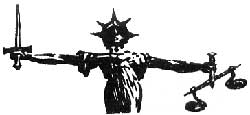
 |
Online
Archive
|
| Issue 10 - February 1973 |
| The Law Is The Law |
 Over the past
few years there have been vast changes in social standards, values
and morals, especially among the younger generation. When the need
for change is obvious and nothing appears to happen, those advocating
the change become discontented, frustrated and militant. Minority groups
become larger and bring more pressure to bear on the establishment,
which in turn adopts stronger pressures of restraint. More people become
discontented and the situation soon gets worse. Over the past
few years there have been vast changes in social standards, values
and morals, especially among the younger generation. When the need
for change is obvious and nothing appears to happen, those advocating
the change become discontented, frustrated and militant. Minority groups
become larger and bring more pressure to bear on the establishment,
which in turn adopts stronger pressures of restraint. More people become
discontented and the situation soon gets worse.
It is the freedom of the press and the individual which is restrained. The freedom to do what you want, say what you want, be what you want, go where you want and live how you want. A look at some recent events and a general pattern begins to emerge that indicates that pressure from the establishment is increasing far more than the pressure on it. For instance when a person or group of people is seen by the authorities to be a threat to their stability, it is becoming increasingly common for prosecutions to be brought for conspiracy, incitement or something equally as non-specific. In fact there are a whole group of laws and acts, some new some archaic, which the authorities can use to suppress those they see as a threat. In other words, if they want to get you they don't need to wait till you commit a 'crime'. These are the laws relating to Official Secrets, Conspiracy, Incitement, Drugs, Censorship, Obscene Publications, Court Injunctions, and the Special Powers, Housing Finance and Industrial Relations Acts. Nearly all prosecutions under these laws could be described as political, and the proportion of not guilty verdicts and the vastly reduced sentences and acquittals on appeal, are significant. In the case of aliens, work permits and visas are not granted or not renewed. Most things that happen in Britain have a forerunner in the United States and the 'Angry Brigade' trial was no exception. After rioting at the Democratic Party's National Convention in Chicago during the 1968 Presidential elections, 8 people appeared in court in what came to be known as the 'Chicago Trial'. The defendants were charged with crossing state lines to incite riots. Two were found not guilty and Bobby Seale (Chairman of the Black Panthers) had the charges dropped after the judge had sentenced him to 4 years for contempt of court, after having him bound and gagged during the proceedings. Bobby is now standing for Mayor in Oakland, California. After 4 years the US appeals court has ruled that the constitutional rights of the five others were violated during the trial, and reversed the convictions. This was just after the Angela Davis trial and she was acquitted as well.
The result of the 'Angry Brigade' trial was that four of the eight were acquitted. At the earlier but related trial of Jake Prescott and Ian Purdie, Ian had been acquitted. Thus only five of the ten accused of conspiring together were convicted, and it seems unjustified that Jake Prescott got 15 years, and the other four 10 years each. The four acquitted at the second trial had been detained for 15 months before being found not guilty. Those convicted are all appealing and the chances of them all being acquitted and making the Angry trial a replica of Chicago are not good, but it's a thought. Many of the younger generation have adopted a new morality especially in terms of drugs and sex. The use of the obscene publications act to suppress 'underground' papers has become common, but in the 'Oz' case the amazingly heavy sentences were virtually removed on appeal, and the 'Nasty Tales' four have been acquitted. In the case of drugs the use of cannabis has become socially acceptable in some circles - more so in the US - and evidence suggests that cannabis is less harmful than alcohol. Despite the Wooton Report which recommended lighter treatment on cannabis, police powers are stronger and sentences heavier. It is not only the young, hippies, revolutionaries and anarchists who get suppressed. When the dockers were on strike, five shop stewards were put in Pentonville for defying the Industrial Relations Court; and the AEWU was fined £50,000 for the same reason. There were more strikes in 1972 than in any year since 1926 and even the civil servants joined in as workers increasingly felt their liberty eroded by the law. Even councillors became law-breakers for not raising the rents of the people they represent and defying the Housing Finance Act. Then the Sunday Times had a High Court injunction that stopped its campaign against Distillers in the Thalidomide affair, and ITV's programme on Andy Warhol met the same fate because of one man's objection. But it becomes obvious that something needs doing quickly when you recall the Special Branch investigation of the Railway Gazette for publishing an article on proposed cuts in the railway system, and the fact that they got a warrant under the Official Secrets Act.
Everyone should ask themselves if they are satisfied with this society, the way it's run, and the lifestyle it dictates - and if not they should stand up and voice their opinion instead of shrugging their shoulders and ignoring the world about them. But keep in mind the 79 year old guy who wrote what he thinks of
the world on the side of his house, and landed in court charged with
advertising without permission.
|